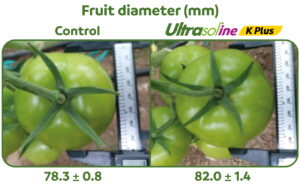A pot experiment on tomato (Solanum lycopersicum L.) was done to examine how to improve yield and quality under saline conditions. The trial was conducted in a glasshouse in Pakistan to study the effect of potassium nitrate rates and mode of application under 3 salinity treatments (0, 7,5 and 15 dS/m, induced by increasing dose of NaCl). Potassium nitrate was applied to the soil (0, 3,3 and 6,6 mmol/kg) or as foliar spray (4,5 and 9 mM). All treatment combinations were performed on four cultivars: 2 salt-tolerant (Indent-1 and Nagina) and 2 salt-sensitive (Peto-86 and Red Ball) field tomato genotypes. Tomato plants, at the 5-leaf stage, were transferred to pots containing 12 kg of field-collected sandy loam soil. Recommended doses of N (210 kg/ha) and P (125 kg/ha) fertilizer were applied, and the amount of N added in the form of KNO3 was taken into consideration. No additional Ca, Mg, S, or B fertilizers were applied, as the basic soil contents of these nutrients in the soil were sufficient to support tomato plant growth. The experiment was laid out in a randomized complete block design with 3 replicates, using factorial arrangement.
Applications of KNO3 in increasing rates resulted in higher yields, both in total fruit weight and in number of fruits, regardless of the mode of application, in absence of salt stress. Potassium nitrate also increased the fruit size. Generally, with increasing salinity stress (7,5 and 15 dS/m), fruit yield decreased significantly. Mainly, this was due to the size of fruits, that decreased with increasing salinity. In contrast, fruit size increased with increasing potassium nitrate concentration.
For plants exposed to salinity, KNO3 alleviated the negative effects of salinity and resulted in a dose dependent increase in plant height and yield of both salt-tolerant and salt-sensitive groups as compared to respective control treatments. However, salt-tolerant genotypes maintained better growth and produced higher yields than the salt-sensitive genotypes across all salinity levels, and showed better response to the treatments with KNO3. Total soluble solids, titratable acidity, pH, and dry matter content of fruits, were significantly improved both by increasing salinity and potassium nitrate application.
To conclude, the use of salt-tolerant tomato genotypes and an increased application of potassium nitrate, both in soil and foliar applications, could be used as an effective approach to economically utilize salt-affected soils for tomato production.



